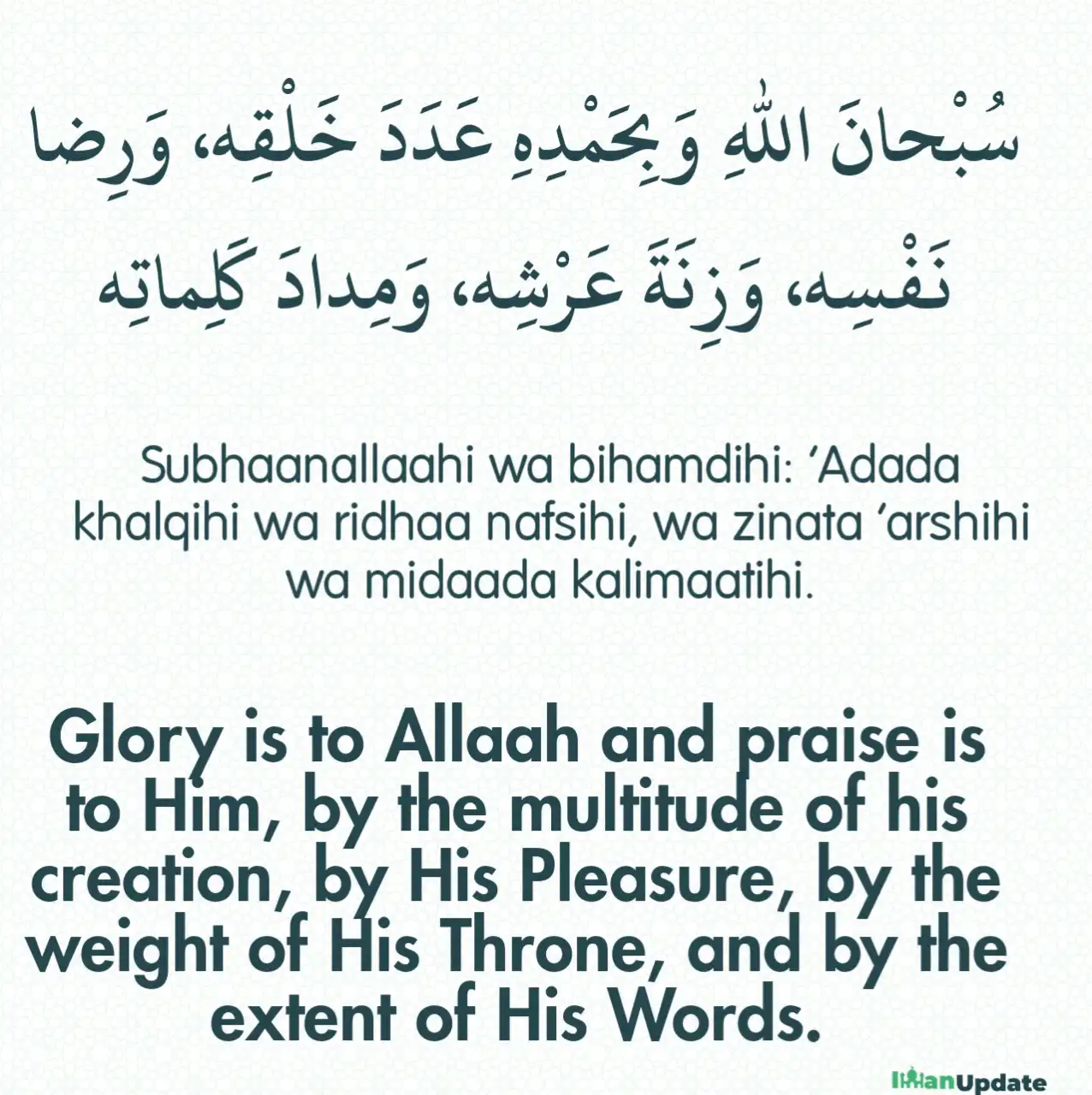Subhanallahi Wa Bihamdihi Adada Khalqihi Meaning, Arabic & Hadith

“Subhanallahi Wa Bihamdihi Adada Khalqihi” is a zikr (remembrance of Allah) that offers profound benefits. This zikr is recommended to be recited three times daily, as stated in an authentic Hadith.
Subhanallahi Wa Bihamdihi Adada Khalqihi Meaning In English
Subhanallahi Wa Bihamdihi Adada Khalqih means Glory is to Allaah and praise is to Him, by the multitude of his creation, by His Pleasure, by the weight of His Throne, and by the extent of His Words.
Subhanallahi Wa Bihamdihi Adada Khalqih In Arabic Text
Here is the full Arabic text of the zikr:
سُبْحانَ اللهِ وَبِحَمْدِهِ عَدَدَ خَلْقِه، وَرِضا نَفْسِه، وَزِنَةَ عَرْشِه، وَمِدادَ كَلِماتِه
Transliteration
The transliteration of this zikr is Subhaanallaahi wa bihamdihi: ‘Adada khalqihi wa ridhaa nafsihi, wa zinata ‘arshihi wa midaada kalimaatihi.
Subhanallahi Wa Bihamdihi Adada Khalqihi Hadith
Juwairiyah (radhi Allaahu anha) reported that one day the Prophet, peace be upon him, left her apartment in the morning as she was busy observing her dawn prayer in her place of worship. He came back in the forenoon and she was still sitting there.
The Prophet, peace be upon him, said to her, “You have been in the same place since I left you?” She said, “Yes.”
Thereupon the Prophet, peace be upon him, said, “I recited four words three times after I left you and if these were to be weighed against what you have recited since morning these would outweigh them, and these words are: Subhaanallaahi wa bihamdihi Adada khalqihi wa ridhaa nafsihi, wa zinata ‘arshihi wa midaada kalimaatihi.
Muslim 2726
READ ALSO: Subhana Rabbiyal Ala Meaning, Hadith and Arabic Text
Sheikh ibn Uthaimeen explained that this Hadith highlights the excellence of a specific form of remembrance of Allah.
The Prophet (SAW) taught Juwayriyyah bint Al-Harith a powerful zikr, which surpasses other forms of remembrance. The zikr involves reciting four phrases, each three times:
- “Subhaanallaah wa bihamdihi, ‘adada khalqihi” (Allah is free from imperfection and I begin with His praise, as many times as the number of His creatures)
- “Subhaanallaah wa bihamdihi rida nafsihi” (Allah is free from imperfection and I begin with His praise, in accordance with His good pleasure)
- “Subhaanallaah wa bihamdihi zinatah arshihi” (Allah is free from imperfection and I begin with His praise, equal to the weight of His Throne)
- “Subhaanallaah wa bihamdihi midaada kalimaatih” (Allah is free from imperfection and I begin with His praise, equal to the ink that may be used in recording the words (for His Praise))
These phrases emphasize Allah’s greatness, creatures, throne, and words, which are beyond human comprehension.
The zikr is a means of glorifying and praising Allah, seeking His pleasure, and acknowledging His majesty.
Reciting this zikr regularly is essential, as it offers a profound connection with Allah and a deeper understanding of His grandeur.
When the Prophet (SAW) left his wife Juwairiyah’s house at Fajr, she was engaged in prayer. Upon his return after sunrise, he found her still in the same position and asked if she had remained so since he left.
When she affirmed, he said, “I recited four words three times, which outweigh all your recitation since morning.”
This Hadith highlights the significance of the zikr: “Subhanallahi Wa Bihamdihi Adada Khalqihi” (Glory is to Allah and praise is to Him, by the multitude of His creation). This phrase is a means of:
- Thanking Allah and acknowledging His perfection.
- Praising Allah for His qualities and blessings.
- Recognizing the abundance of His creation, which deserves infinite praise.
- Expressing gratitude for His pleasure, which is a noble and magnificent reward.
- Acknowledging the weight of His throne, the heaviest creation, deserving the most extensive praise.
The phrase “Adada Khalqihi” (by the multitude of His creation) signifies praising Allah for His countless creations, which is impossible to quantify.
Instead, it means Allah deserves infinite praise, as His creation is constantly expanding.
The phrase “Ridha Nafsihi” (by His pleasure) means praising Allah in the finest way possible, as He only accepts excellence.
Finally, “Zinata Arshihi” (by the weight of His throne) represents the magnitude of Allah’s creation, deserving the most profound praise.

Point To Consider
This concise dua holds immense rewards. Despite Juwairiyah’s (radhiyaAllahu ‘anha) extensive remembrance of Allah that morning, the Prophet (SallaAllahu ‘alayhi wasallam) declared his own recitation of “Subhanallahi Wa Bihamdihi Adada Khalqihi” superior.
The difference lies in the focus on Allah’s greatness, which opens the heart to contemplation and deepens the remembrance beyond mere words. The stronger your heart’s presence in remembering Allah, the greater the reward.
Recite this supplication three times daily with thoughtful intention to maximize the rewards.
The Prophet (SAW) equated reciting this zikr three times to a Muslim perpetuating Allah’s remembrance from dawn until sunset, equal in weight to the greatness of the Throne of the Most Merciful, known only to Allah.
The Throne, the greatest of creations, represents the magnitude of Allah’s grandeur.
Subhanallahi Wa Bihamdihi Adada Khalqihi Benefits
A discerning believer recognizes the value of a authentic Hadith from the Prophet’s Sunnah and reflects on its lessons and benefits.
This particular Hadith highlights the importance of ease in religion, emphasizing that a few words recited with ease can equal the reward of extended periods of remembrance.
The Prophet (SAW) distinguished between Allah’s words and creation, acknowledging the limitless nature of Allah’s words, as stated in the Quran. Unlike creation, Allah’s words are infinite and beyond human count.






